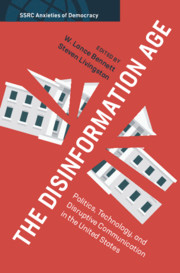The Disinformation Age
The intentional spread of falsehoods – and attendant attacks on minorities, press freedoms, and the rule of law – challenge the basic norms and values upon which institutional legitimacy and political stability depend. How did we get here? The Disinformation Age assembles a remarkable group of historians, political scientists, and communication scholars to examine the historical and political origins of the post-fact information era, focusing on the United States but with lessons for other democracies. Bennett and Livingston frame the book by examining decades-long efforts by political and business interests to undermine authoritative institutions, including parties, elections, public agencies, science, independent journalism, and civil society groups. The other distinguished scholars explore the historical origins and workings of disinformation, along with policy challenges and the role of the legacy press in improving public communication. This title is also available as Open Access on Cambridge Core.
W. Lance Bennett is Professor of Political Science and Ruddick C. Lawrence Professor of Communication at the University of Washington. The focus of his work is how communication affects democratic life. He has held visiting professorships at Harvard, Uppsala, Stockholm, and Free University Berlin. In addition to honorary doctorates from Uppsala and Bern, he has received career achievement awards from the American Political Science Association, the International Communication Association, and the US National Communication Association. His publications include The Logic of Connective Action: Digital Media and the Personalization of Contentious Politics (with Alexandra Segerberg, Cambridge University Press, 2013).
Steven Livingston is Professor of Media and Public Affairs and International Affairs with appointments in the School of Media and Public Affairs (SMPA) and the Elliott School of International Affairs (ESIA) at George Washington University. He is also the founding director of the Institute for Data, Democracy, and Politics (IDDP). He has held visiting professorships and fellowships at Harvard University, the University of Cambridge, the Free University in Berlin, Canterbury University in New Zealand, St. Galen University in Switzerland, and the Brookings Institution.

